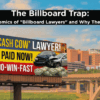
How Improper Expert Testimony Reversed a Sexual Assault ConvictionA Simple Truth: Sexual Assault Conviction Reversed for Improper Expert Testimony
It’s been my experience that folks with mental retardation can be painfully honest, really. I mean, it’s like a little kid who looks at somebody and says in the supermarket, ‘You’re really old,’ or, you know, whatever little kids do.
That was part of the testimony of an MHMR expert at the sexual assault trial of Mark Barshaw. Barshaw was accused of sexually assaulting a mentally retarded victim, who was 21 years-old at the time, but functioned at approximately a 10 year-old level. Upon hearing this testimony, the defense counsel objected, “You can’t have somebody come in and testify to a class of people are truthful.” The State responded by stating that it was simply trying to show how mentally retarded persons “adapt” and that the testimony also went to show that “she’s incapable of either appraising the the situation or the nature of the act.” The trial judge allowed the testimony to continue.
…again, it’s been my experience in the hundreds and hundreds of people with mental retardation that I’ve seen, that it’s more going to be that they’re painfully honest. They haven’t learned the social skills and probably never will to know when you should lie or when it would be socially appropriate to not tell the truth because it might hurt someone’s feelings, or things of that nature, to hold things back.
In allowing the testimony of the MHMR expert, the trial judge abused its discretion, said the 3rd District Court of Appeals (Austin). The Court explained that the Texas Court of Criminal Appeals has held that evidence rule 702 “does not permit an expert to give an opinion that the complainant or a class of persons to which the complainant belongs is truthful.” Yount v. State, 872 S.W.2d 706, 712 (Tex. Crim. App. 1993). Such an expert, is essentially telling the jury that they can believe the victim in the instant case. This, held the CCA, “is not ‘expert’ testimony of the kind which will assist the jury under rule 702.” Id. at 711.
The Court also cited the CCA case Schutz v. State. 957 S.W.2d 52 (Tex. Crim. App. 1977). In Schutz, the CCA explained that:
children and mentally retarded persons are viewed by society as “impaired.” When such a witness is expected to testify, expert testimony should be permitted in the offering party’s case in chief concerning the ability of the class of persons suffering the “impairment” to distinguish reality from fantasy and to perceive, remember, and relate the kinds of events at issue in the case. The court emphasized that such testimony should be limited to the “impaired” class’s ability to accurately relate events and should not extend to the class’s tendency to do so; the latter would violate the holding in Yount.
Id. at 70 (emphasis added). Having violated the CCA holdings in Yount and Schutz by allowing the expert to testify that mentally retarded persons are, as a class, truthful, the Court found harm and reversed the sexual assault conviction.
Justice Henson dissented and would have held that there was no harm in the trial judge’s erroneous ruling.







